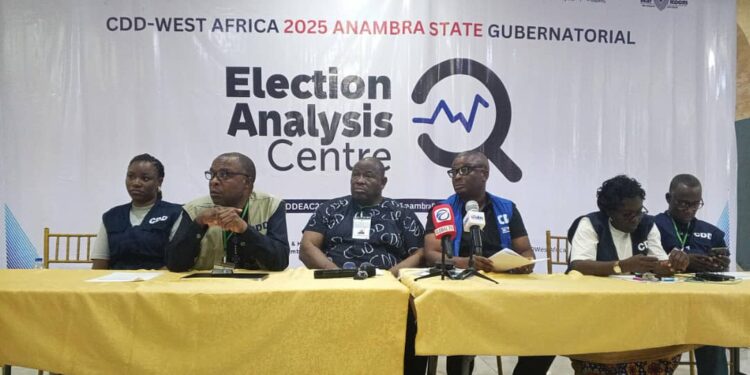CDD West Africa Uncovers Massive Vote Buying During Anambra Poll
The Centre for Democracy and Development (CDD-West Africa) says the Anambra governorship election was marred by massive vote buying.
Prof. Ernest Aniche, of the Election Analysis Centre, CDD-West Africa said this during the preliminary report on the election after monitoring the process in the 21 Local Government Area.
Aniche said the election also witnessed poor turnout, low electoral competitiveness, and the fragility of key electoral institutions and blamed it on public distrust in INEC post-2023, fears of violence or manipulation and intra-party divisions.
CDD-EAC said that 72.2 percent of polling units opened on time, with officials present before 8:30 am, 19.5 percent opened between 8:30 am and 9:00 am, while 1.5 percent began operations after 9:00 am.
The group said women, particularly female candidates faced voter apathy and discriminatory behaviour.
“Female candidates were subjected to dismissive or sexist commentary at polling units, reinforcing the cultural and institutional barriers to women’s political participation.
“However, 5.4 percent of polling units experienced significant delays, with officials arriving after 10:00 am.
“These figures reflect generally effective early deployment by INEC across most areas.
““Party agents offered voters up to ₦10,000 and ₦5,000, depending on the location. For example, in Achina and in Aguata LGA, agents distributed ₦5,000 and ₦2,000 payments to voters.
In Anambra South, similar patterns were recorded. At Ichi in Ekwusigo LGA, and Achina in Aguata LGA, with agents distributing cash payments ranging from ₦2,000 to ₦5,000 in rooms situated directly across polling units.
“At Igboukwu party agents were seen distributing ₦5,000 to voters openly, without any response or deterrent from security personnel,” he said.
The CDD West Africa said INEC failed to visibly display the zero count in some locations and for strict compliance with operational guidelines.
It said the Bimodal Voter Accreditation System (BVAS) failed to capture thumbprints in some cases without corrective measures in place.
On Security, CDD said personnel were present at 87.3 percent of polling units observed while 12.7 percent recorded no security presence at the time of observation.
“In locations where officers were deployed, the security presence consisted of an average of three to four officers per unit, contributing to a calm and orderly voting environment
in most cases,” he said.





































